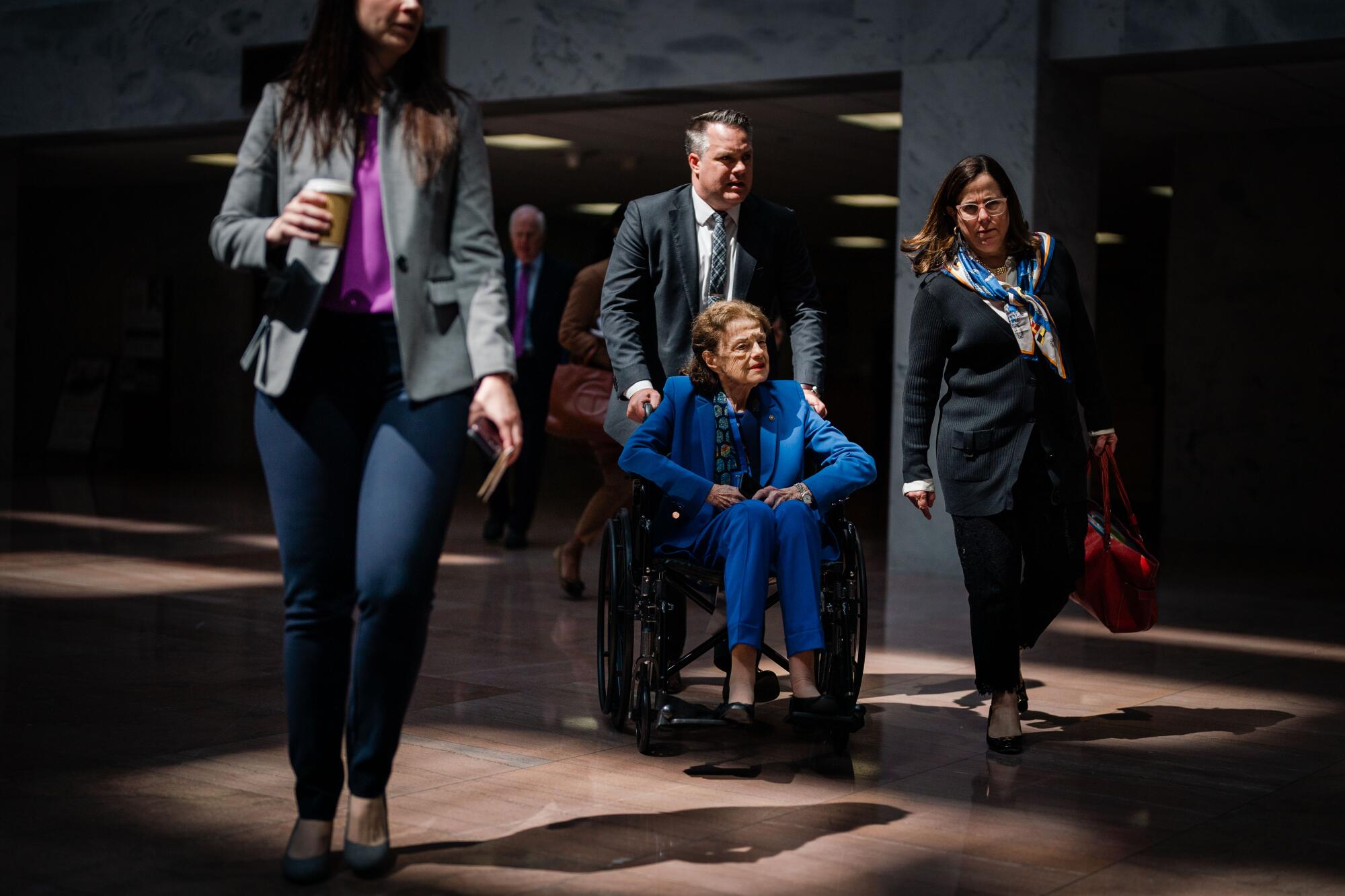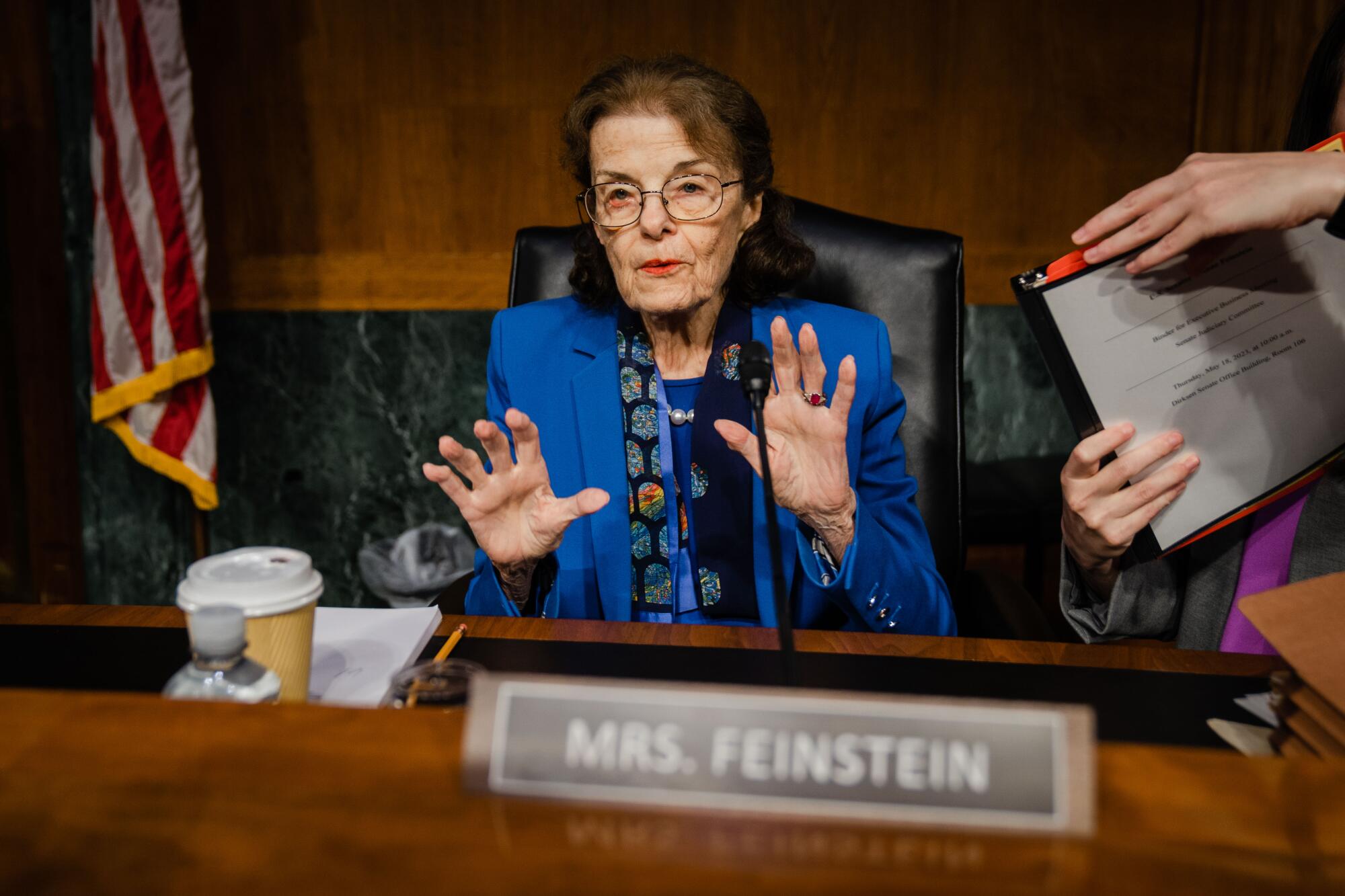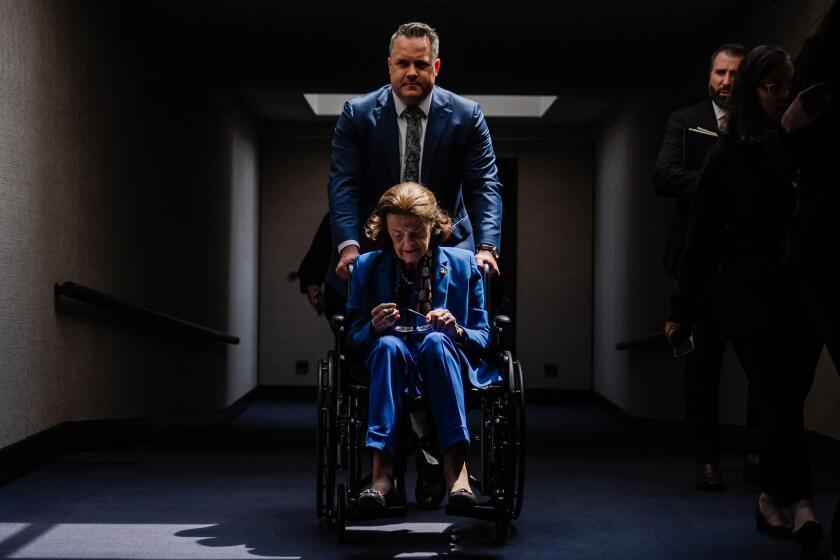
- Share via
WASHINGTON — Along with speculation about Sen. Dianne Feinstein’s health and ability to serve, the California Democrat’s two-month absence from the Capitol this year exposed the deep partisan distrust that permeates the U.S. Senate and threatens to undercut an essential piece of President Biden’s agenda.
Democrats remain skeptical about assurances from Republicans that, should Feinstein, 89, leave office before her term ends in early 2025, there would be no political gamesmanship when replacing her on the powerful Senate Judiciary Committee, the narrowly divided panel that votes on Biden’s nominations to the federal judiciary.
Feinstein’s return to Washington last month assuaged but did not eradicate those concerns, given her age, frail health and evident struggles to keep a busy schedule and maintain all the duties of a senator.
“One of the unknowns is whether the Republicans would agree to fill her seat. That’s the big unknown for me,” Sen. Richard Blumenthal (D-Conn.) told The Times.
Earlier this spring when she was still absent, Republicans rejected a Democratic effort to replace Feinstein temporarily on the committee with Sen. Benjamin L. Cardin (D-Md.) — with some asserting there was no precedent for it and a senior GOP senator saying that Republicans weren’t going to “help what we consider to be controversial or unqualified nominees to get confirmed.”
The lack of confidence in Republicans — particularly if a Supreme Court seat were to open — stems from 2016, when then-Senate Majority Leader Mitch McConnell (R-Ky.) blocked consideration of President Obama’s nomination of Merrick Garland to the U.S. Supreme Court to fill a vacancy left by the death of Justice Antonin Scalia.
McConnell’s maneuver, which swayed the court further to the right, remains seared in the minds of Senate Democrats.
“He’s proved to be relentless in his cunning,” Blumenthal said of McConnell.
While recovering from a case of shingles, Feinstein missed dozens of votes and, because of the Judiciary Committee’s tight voting margins, her absence slowed the process of approving judges even as certain nominees were able to get through with bipartisan support. Recent Times polling found that about 42% of voters wanted her to resign so Gov. Gavin Newsom could appoint a replacement to serve out the rest of her term. Two-thirds said her condition means she’s not fit for office.
Newsom has promised to appoint a Black woman if either of California’s U.S. Senate seats opened up — a calculus made more difficult because the field vying to replace Feinstein when her current term ends includes just one formidable Black woman candidate: Democratic Rep. Barbara Lee of Oakland.
Sen. Dianne Feinstein’s first day back at the Judiciary Committee after an extended absence for shingles — a forum where she spent decades sparring with nominees — was short.
If Feinstein were to step down, Newsom’s appointee wouldn’t automatically be placed on the committees where she serves — which would mean that the Judiciary Committee would have 10 Republicans and 10 Democrats.
In the event of sudden Senate vacancy, a vote to add a senator to a committee would be routine. As opposed to the move to temporarily switch her out this spring, some senior Republicans insist there’s ample precedent for permanently replacing her on committees and suggested such a move wouldn’t be controversial.
Senate historian emeritus Donald Ritchie said Feinstein’s absence was far from the longest and her infirmities while still in office were far from the most severe in the chamber’s history. It’s a body that through the years has had a number old and sick members who needed to be accommodated.
There was, he said, Virginia Sen. Carter Glass, chairman of the powerful Appropriations Committee in the 1940s, who didn’t show up to work for four years after becoming incapacitated with heart trouble.
Then there was California Sen. Clair Engle, who had to be wheeled onto the Senate floor in 1964 to break an epic filibuster during debate of the Civil Rights Act. Stricken with a brain tumor, Engle couldn’t speak, so instead of “aye” he pointed to his eye to signify his vote and cement the landmark legislation’s passage. He died six weeks later.
Sen. Dianne Feinstein uses side and back doors to travel the Capitol complex, and a wall of staffers shield her from scrutiny, reports a Times photographer tasked with covering her. But at what cost?
Ritchie said members are aware of that history, and in the past senators have always been very cooperative about their colleagues’ health and replacing them if they were unable to serve out a term. This collegiality stemmed in part from the belief among senators that “this could happen to me too,” he said. McConnell, who is 81, missed about a month of work this year after a fall resulted in a concussion and some broken ribs.
But now “the Judiciary is the Senate’s most polarized committee,” he said. “It‘s not clear someone else could get on the committee if Feinstein couldn’t serve. Partisanship keeps that from happening. It’s too bad. The institution suffers from that level of political partisanship.”
Throughout her absence and in the first weeks she was back, Democrats mostly refrained from speculating about Feinstein’s future in the Senate. Many said it was up to her to decide if she was fit to serve or not — while reiterating how important it was for her to be in the Capitol to cast crucial votes in the party’s favor.
Then late last month, former Sen. Hillary Clinton opened up the conversation in an interview with Time magazine.
“Here’s the dilemma: The Republicans will not agree to add someone else to the Judiciary Committee if she retires,” she said.
“I don’t know in her heart about whether she really would or wouldn’t [resign], but right now, she can’t. Because if we’re going to get judges confirmed, which is one of the most important continuing obligations that we have, then we cannot afford to have her seat vacant.”
Sen. Sheldon Whitehouse (R-R.I.), who sits next to Feinstein on the Judiciary Committee, followed with a tweet. ”Hillary gets it: the same rule Republicans used to block replacing Dianne on Judiciary while she was ill can also be used if she fully resigns from committee or from Senate,” he wrote.
McConnell, who would need to corral the necessary votes for a Feinstein replacement, declined to comment for this article.
Longtime Republican strategist Scott Jennings, who is based in McConnell’s home state of Kentucky, said his former boss is “not an anti-institutionalist. He never has been, despite the hyperventilating of the Democrats.”
“There may be a routine vacancy,” Jennings said. “Therefore it should be governed by the norms and rules that we would normally operate by. I would just be stunned if somehow the majority party couldn’t operate normally.”

Sen. Lindsey Graham (R-S.C.), who serves on the Judiciary Committee, said if Feinstein resigned he “would be in the camp of following the precedent of the Senate, replacing the person, consistent with what we have done in the past.”
In a recent interview, Graham told The Times he respected the Senate’s traditions and wouldn’t want to see them undermined in this moment. He said this scenario was far different than Garland’s nomination, when Democrats were “trying to get somebody confirmed in an election year.”
(In 2020, Judge Amy Coney Barrett was nominated by then-President Trump and confirmed to the Supreme Court days before the presidential election by a Republican majority, 52 to 48. It was the first time since the mid-1800s that a nominee didn’t receive any votes from the opposing party).
Two top McConnell allies expressed views similar to Graham‘s but were far less committal than the South Carolina lawmaker. The second-ranking Senate Republican, John Thune of South Dakota, told The Times it was “all speculation” right now but acknowledged there is “precedent for somebody who steps aside permanently” for their replacement to get committee assignments.
Another Republican Judiciary Committee member, Sen. John Cornyn of Texas, who is close to McConnell, made a similar argument.
“There would be a negotiation, but I think the biggest objection was trying to do this temporary,” Cornyn said. “I think if the seat was vacated, that would be very different.”
Feinstein’s return allowed the committee to take up and send on to the full Senate four judges who lacked Republican support. There are currently 74 judicial vacancies and 29 nominations that are either pending in committee or awaiting a vote of the full Senate. In his first two years in office, Biden was able to get more people lifetime appointments on the federal bench than Trump or President Obama.
Still, comments from elected officials such as Graham leave Democrats little comfort.
“We’ve seen Republicans break all sorts of traditions,” said Sen. Chris Coons (D-Del.). “I believe, a decade ago, her request for the consideration of a temporary reassignment off the committee would have easily been granted.”
More to Read
Sign up for Essential California
The most important California stories and recommendations in your inbox every morning.
You may occasionally receive promotional content from the Los Angeles Times.













